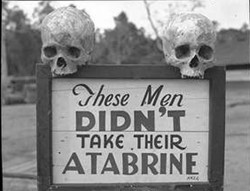 In today’s edition of NtHWS Extras, we’re taking a look at a nearly forgotten medical tale from World War II: The widespread use of Atabrine to combat malaria, with varying results.
In today’s edition of NtHWS Extras, we’re taking a look at a nearly forgotten medical tale from World War II: The widespread use of Atabrine to combat malaria, with varying results.
This story starts all the way back in the 19th century, with a bunch of Dutch smugglers who brought Cinchona seeds from South America to Indonesia (then the Dutch East Indies). Cinchona is the source of quinine, the most effective anti-malarial agent then known. It had long been manufactured in Peru, but the Indonesian plantations quickly cornered the market; they could produce the drug for about half as much as the Peruvians. So by the dawn of World War II, Indonesia was the world’s sole supplier of quinine, and thus a highly strategic asset.
The Japanese were totally hip to this fact, and thus made the invasion of Java of a top priority. After the Japanese conquest of the Dutch East Indies, the Allies suddenly found themselves deprived of a vital pharmaceutical resource—they key to fighting in jungles the world over. Our soldiers were thus forced to resort to Atabrine, a synthetic antimalarial synthesized from coal tars.
Atabrine was mildly effective, but there were some serious side effects. The mildest of these was a deep yellowing of the skin; soldiers on daily Atabrine regimens appeared as if they’d come down with jaundice. More disturbingly, the drug was also known to cause cases of violent psychosis.
In the jungles of northwest Burma, where much of Now the Hell Will Start takes place, Americans were ordered to swallow five grains of Atabrine per day; sergeants sometimes manually forced the pills down privates’ throats. But despite the strict drug regimens, malarial was endemic along the Ledo Road; for every 1,000 men in the field, the Army recorded 955 cases of malaria.
Moral of the story? Diversify your pharmaceutical supply lines!


minderbender // Apr 30, 2009 at 1:29 pm
And who can forget the Splendid Atabrine Insurrection in Catch-22? Actually, I don’t think the insurrection itself is depicted in the book, but it plays a minor part in the story.
Brendan I. Koerner // Apr 30, 2009 at 1:35 pm
@minderbender: Ashamed to say, I’m drawing a blank on that. Then again, haven’t read Catch-22 in ages. Will thumb through my copy tonight–I cannot resist the lure of all things Atabrine-related.
minderbender // Apr 30, 2009 at 10:53 pm
You can use Amazon’s Look Inside feature to find it… it’s really a very small part of the book… I think the Splendid Atabrine Insurrection is discussed somewhere around pp. 90-110, if Amazon’s page numbers are at all accurate.
Jordan // May 1, 2009 at 1:55 am
I don’t know a whole lot about pharmacology, but any drug that requires you to take multiple gram doses either has terrible bioavailability or an absolutely pathetic Kd. Either way, shame on the doctors who couldn’t come up with anything better. That was long before they had to worry about silly things like multiple-drug resistant strains.
Brendan I. Koerner // May 1, 2009 at 8:16 am
@Jordan: In the pharmacologists’ defense, they never really had time to work on a good quinine alternative. That’s because it never occurred to anyone that making a single Dutch colony the world’s sole supplier of Cinchona bark might be risky. They thought the quinine would always flow like water, so there was no need to focus on much of anything else.
Interesting historical backgrounder on Atabrine here, BTW:
http://www.transbay.net/~nessie/Pages/atabrine.html
shothotbot // May 1, 2009 at 11:50 am
One reason why botanical gardens (along with observatories) where such a key part of the imperialist program – it wasn’t about roses. Covered tangentally in this in our time broadcast: http://www.bbc.co.uk/radio4/history/inourtime/inourtime_20060504.shtml
Brendan I. Koerner // May 1, 2009 at 2:48 pm
@shothotbot: Awesome, thanks so much for the BBC link. Gonna give it a listen tonight. (Would do so know, but I’m ensconced in Columbia’s art & architecture library, and foolishly left my headphones at home this morning.)
CHARLES ROBINSON // Feb 24, 2012 at 5:55 pm
I RECEIVED ATABRINE FOR SEVERAL MONTHS {1944) ON SHIP AND AT OUR MESS HALL (GOLD COAST) AFRICA.THAT GAVE ME A TEMPORARY PSYCOSIS.